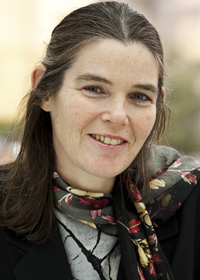Daphne Koller
 Professor of Computer Science, Stanford University; Co-Founder and co-CEO, Coursera Professor of Computer Science, Stanford University; Co-Founder and co-CEO, Coursera
Daphne Koller is the Rajeev Motwani Professor in the Computer Science Department at Stanford University and the co-founder of Coursera, a social entrepreneurship company that works with top universities to make the best education accessible to everyone around the world, for free.
In her research life, Daphne works in the area of machine learning and probabilistic modeling, with applications to computer vision, systems biology, and personalized medicine. She is the author of over 200 refereed publications in venues that span a range of disciplines, and has given over a dozen keynote talks at major conferences.
She is the recipient of many awards, which include the Presidential Early Career Award for Scientists and Engineers (PECASE), the MacArthur Foundation Fellowship, the ACM/Infosys award, and membership in the National Academy of Engineering.
She is also an award winning teacher, who pioneered in her Stanford class many of the ideas that underlie the Coursera user experience. She received her BSc and MSc from the Hebrew University of Jerusalem, and her PhD from Stanford in 1994.
Presentation Title:
The Online Revolution: Learning without Limits
Synopsis:
We are at the cusp of a major transformation in higher education. In the past year, we have seen the advent of MOOCs - massively open online classes (MOOCs) - top-quality courses from the best universities offered for free. These courses exploit technology to provide a real course experience to students, including video content, interactive exercises with meaningful feedback, using both auto-grading and peer-grading, and rich peer-to-peer interaction around the course materials.
We now see MOOCs from dozens of top universities, offering courses to millions of students from every country in the world. The courses start from bridge/gateway courses all the way through graduate courses, and span a range of topics including computer science, business, medicine, science, humanities, social sciences, and more.
In this talk, I'll report on this far-reaching experiment in education, including some examples and preliminary analytics. I'll also discuss why we believe this model can support an improved learning experience for on-campus students, via blended learning, and provide unprecedented access to high-quality education to millions of students around the world.
Read More on Keynote Speakers:
|